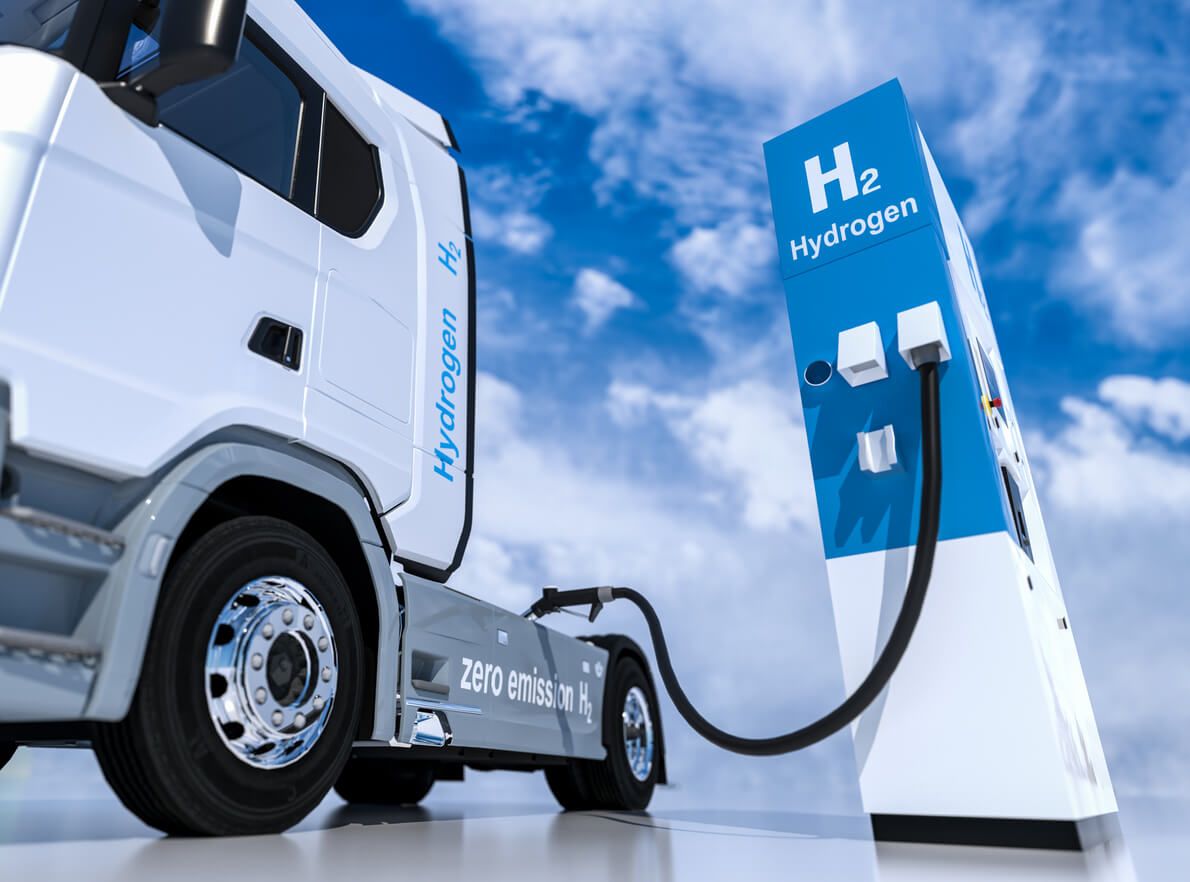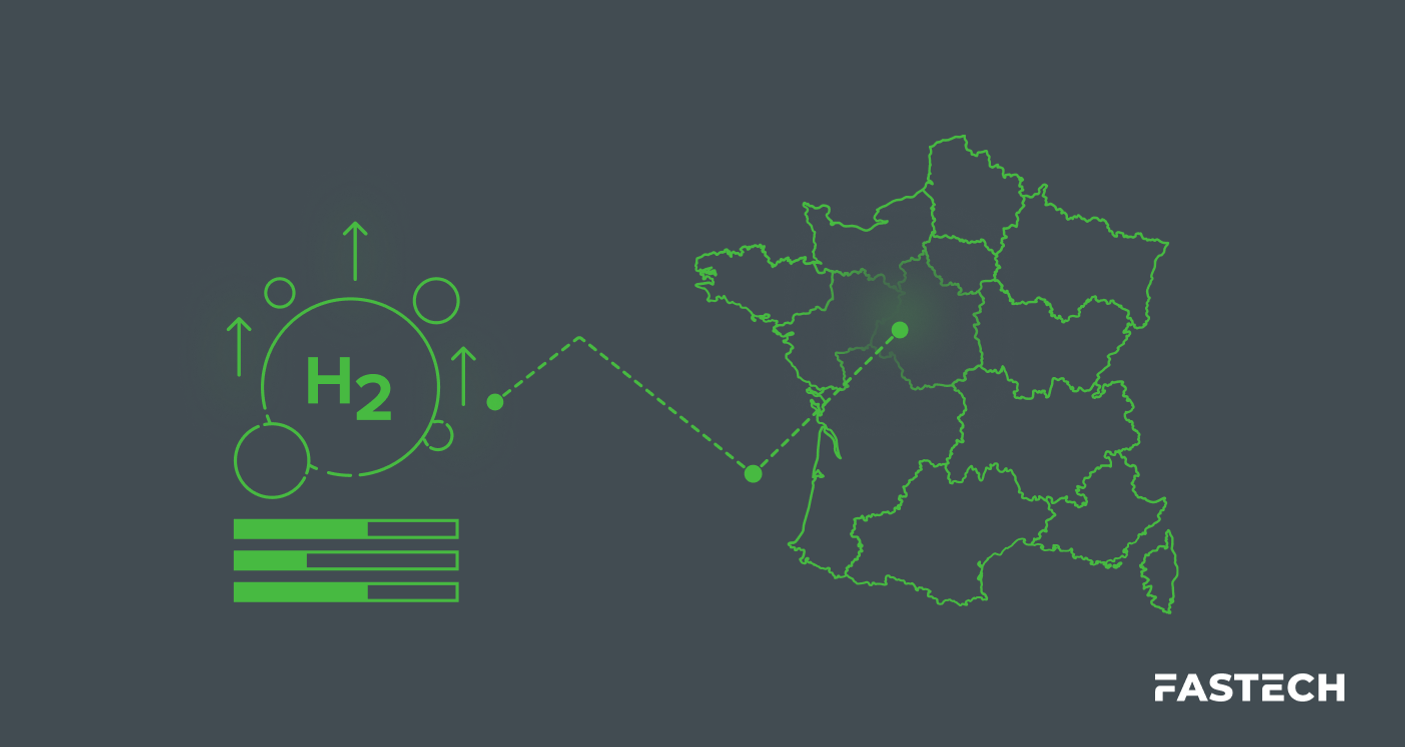The Rise of Heavy-Duty Hydrogen ICE Trucks

Trucks transport more than 70% of all goods that travel throughout the US. Other massive vehicles crisscross our cities, carrying waste, construction materials, and more. The vast majority of the more than 10 million registered medium- and heavy-duty trucks across the country run on diesel or other fossil fuels. However, the rise of heavy-duty hydrogen ICE trucks will change all of that.
Hydrogen ICE trucks—heavy-duty vehicles equipped with engines that burn cleaner, more efficient hydrogen—were once a pipe dream for businesses and climate activists. But now, industries from transportation and shipping to waste collection and construction are rapidly moving toward a sustainable future—and hydrogen power will play a fundamental role.
2022 has seen companies like Cummins and Westport Fuel Systems unveil heavy-duty truck engines that run on hydrogen gas. As these proof-of-concept technologies hit the roads, the transportation industry and the average citizen will reap the benefits.
What is a Heavy-Duty Hydrogen ICE Truck?
A heavy-duty truck is any truck with a gross vehicle weight (GVW) of more than 26,001 pounds. This weight class can include:
- Long-haul semi trucks
- Cement mixers
- Garbage trucks
- Mobile cranes
- Transit buses
Therefore, a heavy-duty hydrogen ICE truck is any vehicle equipped with an internal combustion engine (ICE) that burns hydrogen gas. As such, hydrogen ICE trucks don’t require any fossil fuels to operate.
How Hydrogen Internal Combustion Engines Work
Traditional internal combustion engines burn fuel—such as gasoline or diesel—to create heat inside an engine’s cylinders. This heat moves pistons up and down, causing them to rotate the crankshaft that propels the vehicle forward. Throughout this process, byproducts like carbon dioxide (CO2) are emitted as exhaust.
Hydrogen internal combustion engines work in much the same way as regular internal combustion engines, but with one notable difference. Instead of burning gasoline or diesel fuel, these engines run on hydrogen gas.
Because there’s no carbon in hydrogen, hydrogen ICEs don’t emit carbon emissions. Instead, the primary byproduct of burning hydrogen is water vapor (H2O). When the hydrogen burns in the engine's cylinders, it reacts with the oxygen in the air to produce water.
The Benefits of Heavy-Duty Hydrogen ICE Trucks
So, why will we see an influx of hydrogen ICE trucks on the road in the coming years? Heavy-duty hydrogen ICE vehicles offer a range of benefits to any industry that relies on transportation—regardless of the distance traveled.
Let’s look at some of the most notable advantages of hydrogen ICE trucks.
Fewer Emissions (and Zero Carbon Emissions)
First and foremost, hydrogen ICE trucks are the greener option. As mentioned, the traditional ICEs in trucks produce harmful emissions—and lots of them. In 2020, 26% of transportation-related greenhouse gas emissions were made by medium- and heavy-duty trucks. These gases are the number one cause of climate change and include:
- Carbon dioxide (CO2)
- Carbon monoxide (CO)
- Methane (CH4)
- Fluorinated gases
Hydrogen ICE trucks don’t emit any of these gases. However, they can still produce some emissions.
Like traditional ICEs, hydrogen ICEs can emit a small amount of nitrogen oxides (NOx). Additionally, some forms of hydrogen production can create greenhouse gases (which is why organizations refer to different “colors” of hydrogen to separate sustainable hydrogen sources from less-than-ideal ones).
Overall, hydrogen-burning engines are much better for the environment than their diesel-burning counterparts. Transitioning to hydrogen ICE trucks could mean better air quality and decrease our collective carbon footprint.
Reduced Freight Costs
Hydrogen has existed as a known fuel source for decades, but steep costs have long acted as a deterrent. However, with advances in the technology behind hydrogen production and transportation, hydrogen fuel is quickly becoming a low-cost alternative to diesel and gasoline—especially as gas prices reach record highs.
Although the logistics industry is working to move away from non-renewable energy, most forms of transportation are still powered by costly gasoline, biofuels, and natural gas. According to a 2021 piece by North American freight organization Mexicom Logistics, 94% of the industry’s energy comes from fossil fuels.
By moving to hydrogen ICEs, businesses could save unprecedented amounts of money on moving goods and people.
Reduced Cost of Goods and Services
When the cost of powering trucks drops, everyone benefits. Rising gas prices have been the primary driver of post-pandemic inflation since nearly all goods are transported by gas-guzzling vehicles.
If cost-effective hydrogen ICE trucks take over, consumers should theoretically see a decrease in the price of all goods—from necessities to luxuries.
Services that rely on heavy-duty trucks (such as construction or waste collection) that embrace hydrogen ICEs will also see a dip in operating costs. If these industries pass their savings on to their customers, the average person could enjoy more affordable public and private services.
Familiarity Surrounding Maintenance and Repairs
Heavy-duty trucks can run on other alternative fuels (such as electricity or hydrogen fuel cells). However, these technologies present truck mechanics with a problem: Hydrogen fuel cell electric vehicles (FCEVs) and battery electric trucks are nothing like internal combustion engines. As a result, the countless mechanics who work on heavy-duty trucks would have to re-learn how to maintain and repair their electric or FCEV fleets.
With a hydrogen ICE truck, there’s almost no learning curve for maintenance personnel. Anyone with experience working on traditional internal combustion engines can translate their knowledge to a hydrogen-burning ICE. This benefit will make the transition to alternative energy much more enticing to businesses, as training expenses will be minimal.
Supporting the Rise of the Hydrogen ICE Truck
Ultimately, heavy-duty hydrogen ICE trucks represent an economical and eco-conscious solution for businesses and governments worldwide. However, as more and more of these trucks hit the roads, the country needs to prepare for them with more (and better) hydrogen infrastructure.
At FASTECH, we’re ready to help organizations get ready.
As a designer and builder of end-to-end hydrogen solutions, we’ve been closely watching the hydrogen ICE industry for some time. After building dozens of hydrogen stations across the US, we have the expertise to help usher in this new step forward in clean technology.
If you’re interested in preparing for the next generation of alternative fuel vehicles, we can bring your vision to life. Contact us today to learn more about our expertise in hydrogen infrastructure.




